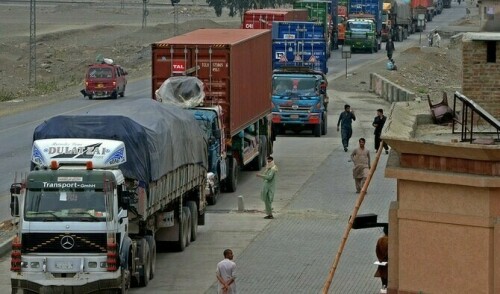Quetta Businessmen Voice Trade Concerns to Senate Committee
Representatives from the Quetta Chamber of Commerce briefed the Senate Standing Committee on Finance regarding significant hurdles encountered by local business owners in conducting trade across the Pakistan-Iran and Pakistan-Afghanistan borders, according to reports.
The business community emphasized a substantial trade imbalance, noting that while Pakistan imports numerous items from Iran, its exports to Iran are limited to only about 10 commodities.
Chamber representatives including Muhammad Ayub Mariani, Haji Akhtar Kakar, and Mir Wais Khan, reported that they had previously communicated these trade obstacles with Iranian and Afghan counterparts, as well as senior officials.
The committee learned that the requirement for an Electronic Import Form (EIF) had effectively stopped bilateral trade, resulting in Pakistani cargo vehicles being detained in Iran for extended periods of 15 to 20 days.
Concerns were also raised about elevated attestation and visa expenses.
Discussions also encompassed the Joint Economic Forum and Joint Border Trade Committee with Iran. Regret was voiced that neither country had acted upon the recommendations from these bodies.
The businessmen advocated for the incorporation of officials from the federal ministries of Commerce and Finance, alongside representatives from the Prime Minister’s Office, into the Economic Forum and Joint Border Trade Committee’s merger to facilitate conclusive resolutions.
They voiced concerns about the intermittent opening and closure of the Badini border, the reactivation of the Qamaruddin Karez border, the underutilization of border marketplaces, and proposed potential solutions.
The representatives highlighted that resolving cold storage, LPG terminal, and other infrastructural challenges at the Chaman and Taftan borders could lead to a notable increase in trade with neighboring nations.
Committee Chairman Saleem Mandviwalla acknowledged receiving complaints about Pakistan-Iran and Pakistan-Afghanistan trade matters for the past half-year.
Mandviwalla assured that some problems would see immediate resolution, while others would be escalated to higher authorities.
Mandviwalla further mentioned receiving a list of issues from the Iranian Consul General, along with the challenges voiced by Balochistan’s business sector. These matters are intended to be brought to the attention of the Iranian president and his delegation during an upcoming visit.
The Iranian President is scheduled to visit Pakistan for a two-day period.



Comments (0)
No comments yet. Be the first to comment!
Leave a Comment